

Mindus Interruptus: Distractions are Costlier than You Think! Let's face it. We hardly ever have the luxury of focusing on one thing anymore. No matter where we are, our gadgets are there, too, ready to beep, ping, display an alert, or serenade us with our chosen ring-tone. So we live with it all. But do we realize how much we're losing this way? There is mounting evidence that the cost of constant interruptions is huge. The big take-away from the research is that students who were interrupted by the instant messages took much longer. In other words, being interrupted to read and reply to IMs added either 22% or 59% to the time it took to read the article, depending on which other condition you choose as a base-line.
Surprisingly, the three groups did not differ in their performance on the memory test. How to Succeed Without Really Trying. How To Learn Anything. Over the weekend, I was riding up a chairlift (mountain biking) and talking to a college kid (stranger, don’t even know his name) and was asked an interesting question: when do I feel like I know enough to write about a subject.
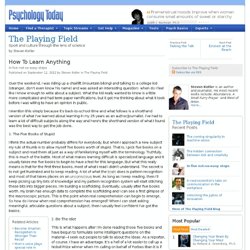
What the kid really wanted to know is a little more complicated and had term paper ramifications, but it got me thinking about what it took before I was willing to have an opinion in public. How Humans Learn: Lessons from the Sea Squirt. One Key to Having a Good Memory? Knowing When to Rest. Sitting quietly with your eyes closed for just a few minutes can mean the difference between successfully committing important information to mind versus forgetting it.
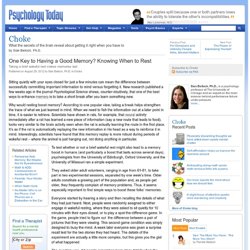
New research published a few weeks ago in the journal shows, counter-intuitively, that one of the best ways to enhance memory is to take a short break after you learn something new. Why would resting boost memory? According to one popular view, taking a break helps strengthen the trace of what we just learned in mind.
Psychology Study Tips - How to Study Psychology - Study Tips for Psychology Students. Students of psychology soon realize that the subject covers a huge range of material.
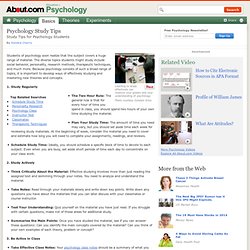
The diverse topics students might study include social behavior, personality, research methods, therapeutic techniques, and much more. Because psychology consists of such a broad range of topics, it is important to develop ways of effectively studying and mastering new theories and concepts. 1. Study Regularly The Two Hour Rule: The general rule is that for every hour of time you spend in class, you should spend two hours of your own time studying the material.Plan Your Study Time: The amount of time you need may vary, but you should set aside time each week for reviewing study materials.
University of Victoria - Counselling Services. The UVic Learning Skills Program, housed within Counselling Services, assists UVic students in the development and practice of efficient study techniques, effective learning methods, and high-level thinking skills that are important for success in university.
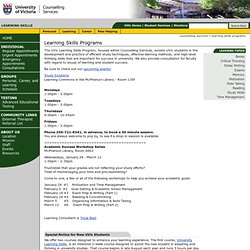
We also provide consultation for faculty with regard to issues of learning and student success. Be sure to check out our upcoming events! Study Solutions Learning Commons in the McPherson Library - Room 135f. Effective Learning Skills (concentration, memory, and more) By Craig Rusbult, Ph.D.
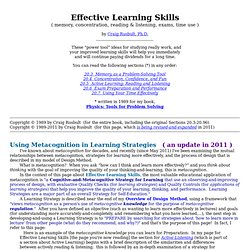
These “power tool” ideas for studying really work, and your improved learning skills will help you immediately and will continue paying dividends for a long time. You can read the following sections (*) in any order: 20.3 Memory as a Problem-Solving Tool 20.4 Concentration, Confidence, and Fun 20.5 Active Learning: Reading and Listening 20.6 Exam Preparation and Performance 20.7 Using Your Time Effectively * written in 1989 for my book, Physics: Tools for Problem Solving Copyright © 1989 by Craig Rusbult (for the entire book, including the original Sections 20.3-20.96) Copyright © 1989-2011 by Craig Rusbult (for this page, which is being revised-and-expanded in 2011) 20.3 Memory as a Problem-Solving Tool.
Effective Learning Skills & Strategies - Study Skills & More. What do you think about these two ways to cut a tree?
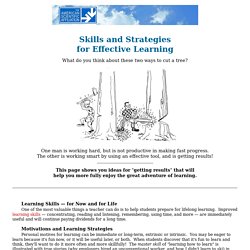
One man is working hard, but is not productive in making fast progress. The other is working smart by using an effective tool, and is getting results! This page shows you ideas for "getting results" that will help you more fully enjoy the great adventure of learning. One of the most valuable things a teacher can do is to help students prepare for lifelong learning. Improved learning skills — concentrating, reading and listening, remembering, using time, and more — are immediately useful and will continue paying dividends for a long time. Motivations and Learning Strategies.
University of Victoria - Counselling Services. H.D.
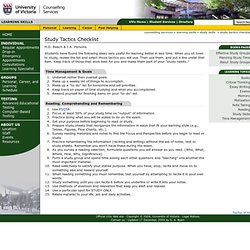
Beach & J.A. Parsons Students have found the following ideas very useful for learning better in less time. When you sit town to study, review the list and select those tactics you will use. Then use them, and put a line under that item. Time Management & Goals. Review Strategies - Learning Skills from MindTools. Committing Learning to Long-Term Memory Review what you've learnt to increase retention. © iStockphoto/blackred.
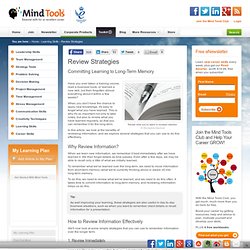
Power up your PowerPoint. You knew it would be a bad presentation the moment a cartoon Freud tap danced across the presenter's first slide.
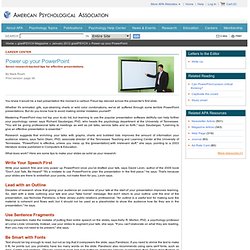
Whether it's animated .gifs, eye-straining charts or wild color combinations, we've all suffered through some terrible PowerPoint presentations. Think you'll ace that test? Think again, then start studying. We hold many beliefs about memory -- for instance, if you study more, you learn more.

We are also constantly making judgments about particular instances of learning and remembering -- I'll never forget this party! Www.scotthyoung.com/blog/Programs/HolisticLearningEBook.pdf. How to Ace Your Finals Without Studying. I’ve never been that keen on studying before an exam. I rarely study for more than a half hour, even for big final exams worth more than half my grade. When I do study, I usually just skim over the material and do a few practice questions. What Storytellers Can Teach You About How to Learn Faster. How Mistakes Can Make You Smarter. OK, nobody wants to make mistakes -- but how you react to them makes a big difference in whether you learn from them.
Two new studies looked at what happens in people's brains as they make mistakes. One used college students performing a computer task; the other used doctors making decisions about which medications to prescribe. In both studies, participants received immediate feedback about whether they had made the right decision, and they were given opportunities to try again, using what they had learned. It turns out that there are two typical brain responses to mistakes. To Learn Better, Sleep on It: Scientific American Podcast. Wanna be lazy and productive at the same time? Do We Learn While We're Asleep?
In a nation where most people burn the candle at both ends, sleep is a precious and increasingly scarce commodity. 12 Ways to Improve Concentraton. Homework Tips - Help With Homework. College and University Study Techniques - how to articles from wikiHow. How to Do Well in College: 9 steps. Edit Article Edited by Devan Richardson, Ben Rubenstein, Manuel_Montenegro_THANKS! , Tom Viren and 35 others. College Studying Tips for Final Exams. Having good college studying tips can make or break your performance during finals week.